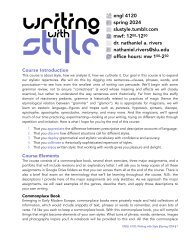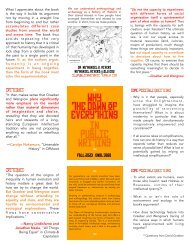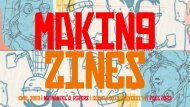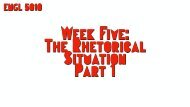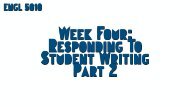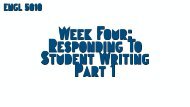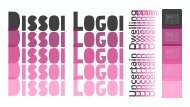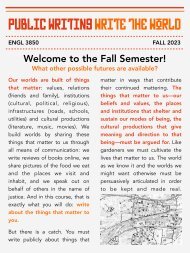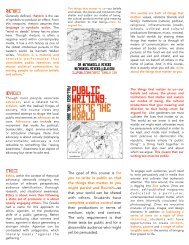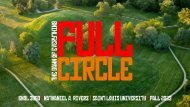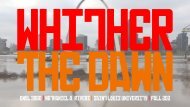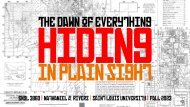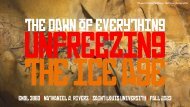ENGL 5010 Syllabus (FA23)
You also want an ePaper? Increase the reach of your titles
YUMPU automatically turns print PDFs into web optimized ePapers that Google loves.
and cognition. Sociality and identity are also present and at stake here. How do we come to know both our worlds<br />
and ourselves? How can we come to help others know themselves and their worlds? There is, then, a profound<br />
ethical component to teaching. The word educate, etymologically, means to lead out, to draw out, to bring forth. We<br />
will thus ask to where are we leading them, what are we drawing out, and who are we bringing forth?<br />
Course Texts<br />
• The Animal Who Writes by Marilyn Cooper <br />
• Antiracist Writing Assessment Ecologies: Teaching and Assessing Writing for a Socially Just Future by Asao<br />
B. Inoue [Free Online]<br />
Additional readings and documents are shared via our Google Drive folder.<br />
Course Elements<br />
Social Annotation & Participation<br />
We cultivate and collect our thoughts on course readings using Hypothes.is, an online annotation application.<br />
Annotations vary from person-to-person, but our overriding goal is to share reactions, questions, interests, and dis/<br />
beliefs through annotating our readings together. Annotations take the form of comments, questions, intra- and<br />
inter-connections, and links. Annotations, crucially, add to the readings—they set them in motion.<br />
Research Binder<br />
At the conclusion of this course, you will submit a research binder. This binder will include every piece of paper you<br />
generate over the course of the semester. The binder is thus an archive. As an archive, it should have an<br />
organizational scheme that makes it accessible to both you and your instructor. Individual entries should be dated<br />
and described (e.g., quiz, reading-journal, notes, etc.). In addition to labeling individual entries, the binder itself<br />
should be organized in a coherent, compelling and accessible way. As an archive, it should trace the work of<br />
cultivating yourself as a teacher. Your binder should archive the following items:<br />
1. In-class Writing/Take-Home Assignments: Occasionally, you will be asked to write in class, and<br />
sometimes you’ll be asked to do short writing assignments at home.<br />
2. In-Class Notes: Follow this format for your in class-notes, using the affordances of your double-docket<br />
legal pad or GoogleDoc. This format requires you to annotate your own notes as one might annotate<br />
readings. These annotations serve both a formative and an archival purpose.<br />
Annotations (after class)<br />
What Aristotle means is that the<br />
rhetorician can see how people might<br />
think through possibilities specific<br />
situation. <br />
Every situation is different, a different<br />
context and a different audience. So<br />
the way you talk about something will<br />
be different in those different<br />
situations. Rhetoric doesnt deal with<br />
universal problems…it deals with<br />
specific problems.<br />
I have to ask about this tomorrow!!!<br />
August 28, 2019<br />
Notes (in class)<br />
Available Means: Rhetoric is the ability to see the available means<br />
of persuasion in every given case<br />
Aristotle: Greek philosopher 384-322. Came up with idea of<br />
available means. <br />
Connotation vs. denotation: connotation is how a word feels;<br />
denotation is what a word means. <br />
●<br />
School vs. education…one has a more sophisticated<br />
connotation. <br />
●<br />
Romance vs. relationship…they can refer to the same thing,<br />
but the words will have different feelings, different attitudes.<br />
3. In-Class Presentation: Several weeks into the semester, you will select a set of assigned readings to<br />
present on. Your presentation will shape our discussion of those readings and it should include<br />
supplemental materials such as a handout, a slide deck or an exercise. <br />
Rivers | English <strong>5010</strong> | Fall 2023 | 2




